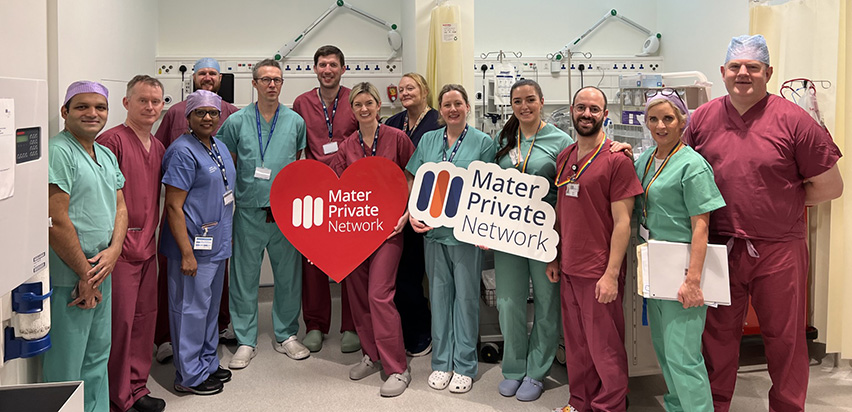Nuclear Medicine
Contact Us
Request an AppointmentPlease note that a referral letter is required before an appointment can be confirmed.
Useful Information
About nuclear medicine
Nuclear medicine imaging involves using minimal amounts of radioactive materials that may be injected into the bloodstream, inhaled or swallowed. Images are produced by detecting the radiation from different parts of the body using a specialised scanner called a gamma camera. Nuclear imaging is also used in theranostics, a cutting-edge approach to diagnose and treat certain cancers.
We offer a wide variety of different nuclear medicine scans at Mater Private Network. These include:
- Bone imaging
- Brain imaging
- Thyroid and parathyroid imaging
- Cardiac amyloid imaging
- Lung perfusion and ventilation imaging
- Bile acid malabsorption imaging (SeHCAT)
- Renal imaging
- Gastrointestinal imaging
- Endocrine imaging
What you should know
- Each different scan in nuclear medicine requires different preparation. A preparation leaflet for each type of scan is available to download below.
- It is helpful to avoid wearing large metal items such as belts or watches as these may need to be removed for your scan.
- Ensure that you are well hydrated prior to your scan.
- You should not book any other appointments (medical or otherwise) in the 24 hours after your nuclear medicine appointment.
- The radiographer will ask you to complete a pregnancy declaration form. You must be able to select an option that shows that there is no chance you are pregnant to proceed with your scan. Please inform us if you are breastfeeding.
- Please inform us if you have poor kidney function.
Detailed information regarding the procedure for each different type of scan is included in the preparation leaflets in the patient information section below.
The radiographer performing your scan will give you detailed instructions regarding radiation precautions to follow after your scan. These typically include:
- Avoiding close contact with infants, children and pregnant women for minimum 24 hours after your injection
- Drinking plenty of fluids and emptying your bladder regularly
- Postponing other tests and appointments for minimum 24 hours after your scan where possible
- Nursing mothers may need to express and discard breast milk for a number of hours following the scan
Your scan will be reported by a consultant radiologist specialising in nuclear medicine. The results will be sent directly to your referring doctor.
We are all exposed to natural background radiation every day. Medical exposures give a small additional dose on top of natural radiation.
The amount of radiation received during a nuclear medicine procedure is low, resulting in the equivalent of approximately a few months to two year’s background radiation.
The only effect on the patient that is known to be possible at these low doses is a very slight increase in the chance of cancer occurring many years or decades after the exposure.
As long as it is clearly necessary to help make the correct diagnosis and treatment decision, the benefits of detection, diagnosis and treatment resulting from the nuclear medicine examination should outweigh these small radiation risks.










